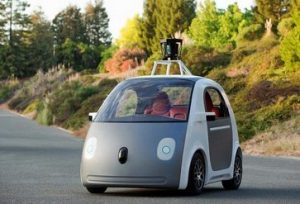 As I covered last year in “Hands off the Steering Wheel,” autonomous vehicles (aka self-driving and driverless cars) are gaining more interest and support than would have been expected at this time. While connected cars with advanced technologies are increasing with each new model year, here’s a look at news and developments on where autonomous vehicle technology is likely heading in the near future………
As I covered last year in “Hands off the Steering Wheel,” autonomous vehicles (aka self-driving and driverless cars) are gaining more interest and support than would have been expected at this time. While connected cars with advanced technologies are increasing with each new model year, here’s a look at news and developments on where autonomous vehicle technology is likely heading in the near future………
- Google Inc. is moving beyond its test project and is talking to major automakers and suppliers to help move self-driving cars along. Google’s Chris Urmson, who leads the project, spoke last week at Automotive News World Congress in Detroit; he said that the suppliers include Bosch, a supplier of power electronics and long-range radar to Google, steering-gear supplier ZP Lenksysteme, and battery supplier LG Electronics. Roush, the engineering and specialty manufacturing company (and parent to Roush Cleantech) has built the two-seat pod-like car for Google, which Google will start testing on public roads this year.
- Urmson declined to state which automakers Google is talking to. Reuters reported earlier that these OEMs include General Motors, Ford, Toyota, Daimler, and Volkswagen. Urmson did say that Google will be looking for a major automaker to build its pod-like self-driving car, when it’s time to commercialize the technology. He did emphasize that Google won’t be entering the business of manufacturing cars. “We’re definitely not in the business of making cars,” he said.
- At the Consumer Electronics Show in Las Vegas this month, Daimler AG CEO Dieter Zetsche in a keynote speech depicted his company becoming the leader in building autonomous vehicles when he unveiled the Mercedes-Benz F015 autonomous concept vehicle. That will probably roll out after 2020, but for this decade Daimler will be making more vehicles with assistance programs including the ability to park themselves once drivers have exited.
- Tesla CEO Elon Musk thinks that fully autonomous driving can be a reality within five years; and then it will take another two-to-three years to prove that self-driving cars are safe and for regulatory rules governing autonomous vehicles to be in place.
- Liability will probably be rising for automakers once autonomous vehicles become commonplace, according to Washington Post blogger Emily Badger. Insurance companies focus on who is responsible for a vehicle collision and how liability will be apportioned. The vehicle itself is rarely blamed, but that will change with self-driving cars. “Liability will inevitably rise for automakers, which is one reason they might be reluctant to see a broad and speedy rollout of autonomous cars,” Badger wrote.
- Transportation Research Institute at University of Michigan, which tracks average fuel economy in new vehicles sales, just issued a paper on road safety with self-driving vehicles. Authors Michael Sivak and Brandon Schoettle don’t see self-driving cars bringing vehicle fatalities down to zero; and safety may worsen during a transition period for conventional vehicles when both self-driving and conventional vehicles share roads.



